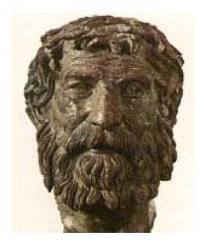[ Yì Jīng | Pythagòras | Gautama | Kǒng Fūzǐ | Lǎo Zǐ | Herákleitos | Parmenídēs | Zḗnōn | Empedoklês | Prōtagóras | Sōkrátēs | Plátōn | Aristotélēs | Zhuāng Zǐ | Diódōros | Ptolemaîos | Tertullianus | Plōtínos | Augustinus | Próklos | Shankara | ibnʿArabī ] – other periods
 The Sicilian philosopher Empedoklês (Ἐμπεδοκλῆς) (c.-490/c.-430) is clearly a philosopher of opposition, at least in the sense that his cosmology is based on the idea that two eternal and alternative principle, “Love” and “Hate” (or “Union” and “Disiunion”) regulate the cosmic cycles leading the elements either to aggregate or to separate. According this view, no supremacy of either Principle is to be wished as such by humans, for life is inpossible in bot cases (total harmony or total chaos). Life is possible in the intermediate eras and, in particular, when the action of Love starts a new cycle, many separate “organs” (like proto-forms of legs, eyes, heads, …) are progressively associated in a random way, upon the basis of which, through a natural selection (which somehow announces Darwin‘s famous idea), some forms of life do emerge which are tenable (this is some kind of “scientific model” for accounting the existence of creatures like centaurs and the like, probably based on the real observation of natural “monsters”). Empedoklês seems to have been influenced among others by Herákleitos (as for the notion of constant flux), Parmenídēs (as for the ideal of binary opposition and stable, deadly fixity) and by the atomists (as for the idea of the existence of elements generating the complexity of the world), the latter having probably been influenced by Pythagòras. Moretti uses some Empedoklean ideas in order to radicalise some parts of Badiou’s theory.
The Sicilian philosopher Empedoklês (Ἐμπεδοκλῆς) (c.-490/c.-430) is clearly a philosopher of opposition, at least in the sense that his cosmology is based on the idea that two eternal and alternative principle, “Love” and “Hate” (or “Union” and “Disiunion”) regulate the cosmic cycles leading the elements either to aggregate or to separate. According this view, no supremacy of either Principle is to be wished as such by humans, for life is inpossible in bot cases (total harmony or total chaos). Life is possible in the intermediate eras and, in particular, when the action of Love starts a new cycle, many separate “organs” (like proto-forms of legs, eyes, heads, …) are progressively associated in a random way, upon the basis of which, through a natural selection (which somehow announces Darwin‘s famous idea), some forms of life do emerge which are tenable (this is some kind of “scientific model” for accounting the existence of creatures like centaurs and the like, probably based on the real observation of natural “monsters”). Empedoklês seems to have been influenced among others by Herákleitos (as for the notion of constant flux), Parmenídēs (as for the ideal of binary opposition and stable, deadly fixity) and by the atomists (as for the idea of the existence of elements generating the complexity of the world), the latter having probably been influenced by Pythagòras. Moretti uses some Empedoklean ideas in order to radicalise some parts of Badiou’s theory.
- Bollack, J., Empédocle, I. Introduction à l’ancienne physique, Minuit, Paris, 1965.
- Bollack, J., Empédocle, II. Les origines, édition et traduction des fragments et témoignages, Minuit, Paris, 1969
- Moretti, A., “The Oppositional Geometry of Badiou’s Political Revolutions”, (talk at the UNILOG 2015, paper in progress)